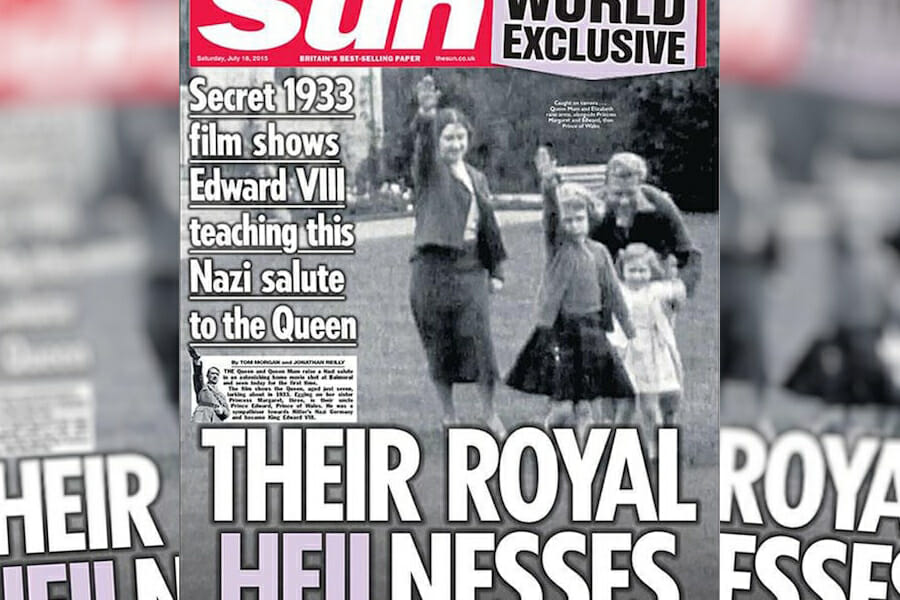
Culture
The Royal Family, the Hitler Salute, and British Policy During the War
The media sensation surrounding the recently released video footage of the Queen of England and her parents happily displaying the “Hitler” Salute for the camera in 1933 might be dismissed as an innocent action at the time. Some might even write it off as little more than practicing the “German” Salute, perhaps not knowing then what evil Hitler was already in the process of unleashing on the Jews and other minorities in Germany. Yet, in 1933 a network of detention camps had already been established in Germany, where political prisoners were being held, and Hitler was already in the process of using the Salute to galvanize support for his political movement.
The reluctance of the Royal Family to release information from the archives that may be incriminating — evidence of either direct or indirect support for Hitler and the extermination of the Jews – is understandable. But if it did reveal such support, it would not be surprising, because the fact is that the British government actively worked against the interests of Jews wishing to migrate to Palestine by severely restricting Jewish emigration to Palestine starting in 1939 (when Hitler’s evil was understood), and kept the restrictions in place until it was forced to rescind them in 1948, under protest. It seems the media is focused on the wrong issue.
While the Nazis prepared to annihilate the Jews in Europe, the British government approved a White Paper in 1939 that severely restricted Jewish immigration to Palestine under the British Mandate. The White Paper reinterpreted the Balfour Declaration and declared that Britain did not intend to build an independent Jewish state in Palestine. The White Paper effectively abandoned the idea of partitioning Palestine and provided instead for an independent Palestine to be governed by Palestinian Arabs and Jews in proportion to their numbers in the population.
A limit of 75,000 Jewish immigrants was set for the five-year period from 1940 to 1944 (consisting of a regular yearly quota of just 10,000 and a ‘flexible’ supplementary quota of 25,000). After 1944, any additional immigration of Jews to Palestine would depend on permission of the Arab majority. At the same time, restrictions were placed on the rights of Jews to buy land, and the British government repeatedly blocked ships filled with refugees from entering Palestine.
By 1943 the BBC had evidence which conclusively proved Hitler’s plan for the “total extermination of European Jewry,” but despite the evidence the BBC foreign and home news boards concluded that “It seemed desirable to soft-pedal the whole thing.” Government censors made sure that the BBC would never be able to say anything contrary to official policy. The government line, echoed by the BBC, was to win the war, then save the Jews. The BBC, in line with the Foreign Office, maintained a very British silence about the Holocaust.
Britain’s policy of denying a place of refuge to Jews facing extermination would have been very difficult to maintain had the public known what the government knew. Britain was determined to postpone active preparations for the Normandy landing until its colonial empire was made safe, which meant waging war for North Africa and Burma, while simultaneously pleading that they weren’t ready to begin preparations for the war in Europe.
By 1943, with its victory in the war for the colonies, the British government had accomplished the first of its two strategic war aims. The other war aim was to prevent revolution in Europe. World War 1 had produced a wave of intense class struggle in many parts of the British Empire. Signs were multiplying that World War II would repeat the experience of World War 1, as the resistance movements in France, Yugoslavia, and Greece were becoming an anti-imperialist struggle. In order to secure the Empire and prevent revolution, the British government in essence decided to sacrifice the Jews of Europe.
At the end of World War II, the British Labor Party conference voted to rescind the White Paper and establish a Jewish state in Palestine, however Labor Foreign Minister Ernest Bevin persisted with the policy and it remained in effect until the British departed Palestine in May 1948. After the war, the determination of Holocaust survivors to reach Palestine led to large scale illegal Jewish migration to Palestine. British efforts to block the migration led to violent resistance by the Zionist underground. Illegal immigrants, who had no citizenship and could not be returned to any country, were detained by the British Government in internment camps on Cyprus in deplorable conditions.
From October 1946, the British Government, under the ‘severest pressure’ from the U.S., relented and allowed 1,500 Jewish migrants per month into Palestine. Half of those admitted came from those prison camps in Cyprus due to fears that a growing Jewish presence in Cyprus would lead to an uprising there. The Provisional Council of Israel’s first constitutional act was a Proclamation that all legislation resulting from the British Government’s White Paper of 1939 would become null and void.
The British Government turned its back on the Jews of Europe and failed to aid Jewish resistance groups in Europe as a result of political and economic expediency. It was more concerned with access to oil from the Middle East and maintaining its Empire than the plight of the victims of Hitler’s atrocities. Only in 2013 did Prime Minister Cameron become the first British leader to establish a Commission on the Holocaust, and it was only in 2015 that the Commission recommended that Britain create a national memorial to the Holocaust – 70 years after the end of the War. Just as the French and the Germans have done, the British people should take a cold hard look at their government’s policy and actions during the War.

